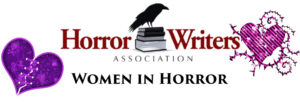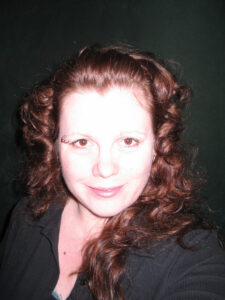Women in Horror: Interview with Angel Leigh McCoy


Angel Leigh McCoy writes the Wyrdwood series of interconnected paranormal suspense and mystery novels. The Wyrdwood Welcome trilogy kicks it off with Stalking the Moon.
She’s also the mastermind behind Wily Writers, a community of writers who come together for support and to share publishing knowledge. Wily Writers recently published the latest in the Wily Writers Presents series of Horror anthologies, including Tales of Dread, Tales of Nightmares, Tales of Evil, and Tales of Foreboding. Find out more at WilyWriters.net
Previously, she worked as a senior narrative designer for AAA video games such as Guild Wars 2 and CONTROL. Some of her 25+ published short horror stories can be found in Dark was the Night, a collection. Her list of works spans three decades of written word. Keep an eye on her whirlwind at AngelMcCoy.com.
What inspired you to start writing?
I grew up an introvert in a very party-friendly household. Imagine the boozy parties of the ‘60s and ‘70s, and you’ll hit the mark. I was a judgy child who hated those embarrassing “cocktail” parties, so I often withdrew into my room or the closet under the stairs to read. It was my escape, and the love of reading naturally turned to a love of writing. I stumbled onto books like The Sentinel, Carrie, and The Exorcist, and found my jam.
What was it about the horror genre that drew you to it?
Honestly? As a child, I was regularly bullied and hypersexualized by both adults and other kids, so I had come to see the world as menacing. Instead of turning me away from horror, it attracted me to it. The characters in the books I loved dealt with demons and monsters. These evil beings were the personification of the monsters in my own life.
I didn’t have the words to tell anyone about the evil I was fighting, but I suppose horror books made me feel less alone, like maybe my own life wasn’t so bad. And sometimes, the protagonist even won the day. In the case of The Sentinel by Jeffrey Konvitz, the main character survives but makes a sacrifice. The ending isn’t what I would call “happy.” I was obsessed with the seemingly insurmountable struggles the characters faced, and I still am.
Do you make a conscious effort to include female characters and themes in your writing, and if so, what do you want to portray?
Absolutely. In the past, I’ve written short stories where the women in the story are unheroic and maybe even victims. I don’t do this to be gratuitous. On a subconscious level, I think that is still the harangued little girl in me trying to tell people how awful it was for me, and how it can be for women. Not being able to tell anyone is perhaps the biggest violence done to abused children.
As I’ve gotten older, my female characters have become much more heroic. They are now my protagonists, and they fight the evil—and usually win. I’ve thought a lot about this and what it says about my own evolution as a woman and as a human being. The realizations I’ve had about my role in the fight against evil have resulted in a conscious effort to portray women as strong, smart, and fighting off the daily evils that we all encounter to this day.
What has writing horror taught you about the world and yourself?
Horror has guided my introspection with regard to the evil I’ve personally encountered. Evil exists, and horror gives me a language—the words—to talk about it. To spotlight it. And to light the path to surviving it. I don’t ever expect to make a huge impact on the world. I do, however, believe that every woman—great and small—who frees herself from the mantle of abuse is one more star helping to illuminate the darkest nights of our future. Our combined glow lights the path for those who come after us.
How have you seen the horror genre change over the years? And how do you think it will continue to evolve?
I don’t think I’m overstepping when I say that horror has come out of the shadows. Out of the closet even. Back in the ‘80s, people I knew didn’t admit to liking horror. Goths and occult-lovers were a subculture judged by the mainstream. I don’t find that to still be true in our world—at least not in my experience. These days, you’ll get a lot fewer cockeyed looks when you say you love horror than you used to get.
As for the actual story style and content, I find that horror hasn’t changed a whole lot. Yes, it reflects the times more, the advance of technology, the complexity of our lifestyles, and shifting societal taboos. It has become more complex in terms of characterization and plotlines, but those are just scene-dressing. The core of horror is still the same meaty bloody cupcake it always was. If done right, a horror book will be the one people take to read in their own closet under the stairs. It will help them express and understand their night terrors, and it will be the path they walk while fighting their own monsters. It will remind them they’re not alone in the fight against evil.
How do you feel women have been represented thus far in the genre, and what hopes do you have for representation in the genre going forward?
I’m opinionated about this. Fair warning. I think far too many times, women have been used as the victim just because it’s convenient. It’s become a cliché. It feels gratuitous and gross. As if the torture and killing of a woman should be sexy or somehow satisfying.
I’m not opposed to having women victims. Not at all. I think it’s how you approach it that matters. Is the woman a cardboard cut-out who is only there so you can describe her perky breasts and then do bad things to her? Or is she a well-thought-out part of the story, with realistic notes about her identity, painted with real emotion. There is a difference. The first is porn. The second is a horror story.
Having said that, I do believe that authors (myself included) have had the opportunity to learn why porn is not horror, and why you can have a naked dead woman in a story without sliding into porn. It’s a process. Authors are learning. We’ve talked about it, and many authors listened. Readers listened too and started calling out abuses when they saw it. As a result, we’ve moved beyond black and white and into gray. This is good, because sometimes, your story requires that you disembowel a woman.
Who are some of your favorite female characters in horror?
I’ll name the most important one: Carrie. As the story unfolded, every revelation about the horrific life she was living just made me like her more and more. She’s one of the ones who made me feel less alone.
Who are some women who write horror you recommend our audience check out?
- E.S. Magill brings the shock to horror like no one I know. She makes you think, and you thank her for it. Her female characters are realistic and difficult to forget.
- Yvonne Navarro’s characters leap off the page, and her descriptions are visceral.
- Lisa Morton has a classic style that reminds me of Rod Serling (whose work I love).
- Loren Rhoads’ stories have heart, magic, and emotional depth. I’m in love with her series’ main character.
- Jennifer Brozek’s stories are tight and so well written. Her horror is subtle until you realize the protagonist—and you—have been had.
- Alison J. McKenzie is a new writer who produces stories like a pro. I’ve never met a young writer with so much promise. I love her modern perspective on her characters and how she injects so much tension and drama into her stories. Keep an eye on her.
What is one piece of advice you would give horror authors today?
Don’t be afraid to experiment. Horror is experiencing a new renaissance, in my humble opinion. Now is the time to be inventive, to step outside the box built by King and his peers. I remember reading Books of Blood by Clive Barker and being blown away by how different it was from everything else I’d ever read. How cerebral and honest. If you want to truly write good horror and stand out, go deep. Look at what horror really is for you and take risks. Be honest.
And to the women who write horror out there who are just getting started, what advice would you give them?
Never apologize for loving what you love or for writing what you write. Your book; your choice. Be as unladylike as you want. And be as good as you can.
Also learn the grammar so you can break the rules on purpose. Your tools are words. Wield them with precision.



